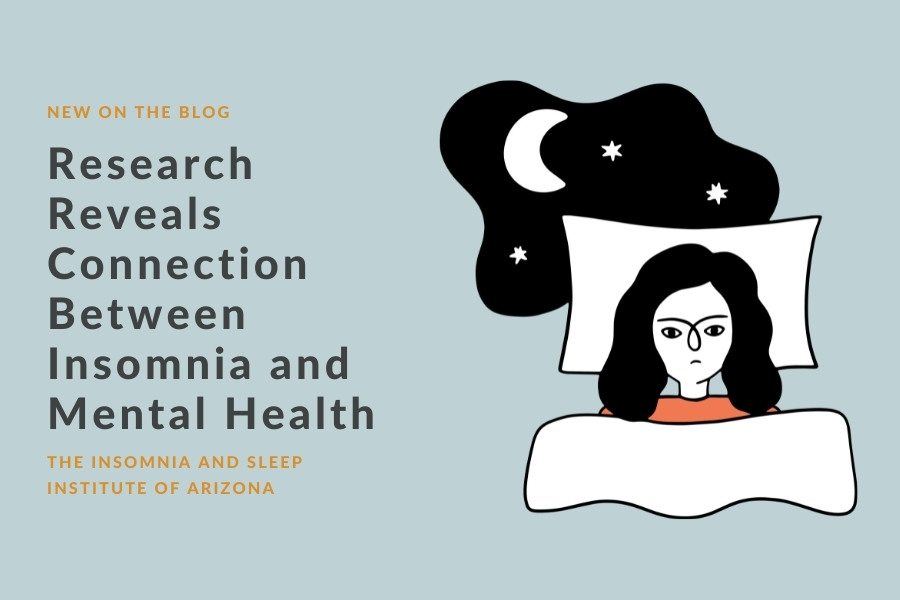Insomnia is one of the most common complaints addressed at The Insomnia and Sleep Institute of Arizona, the Face of Sleep Medicine in the Phoenix area. Here, we set the standard in sleep medicine with unprecedented staffing levels where patients have access to three sleep specialists, a physician assistant with a Masters in Sleep, a clinical psychologist focused on cognitive behavioral therapy for insomnia, and nurse practitioners trained in sleep medicine. Insomnia is the most common of sleep disorders, with 33 percent of those diagnosed with insomnia suffering from it chronically.
Due to the commonality of insomnia, patients often consider their symptoms “normal” (albeit annoying). In reality, insomnia—and especially chronic insomnia—can lead to serious health issues that negatively affect daily function. Mental health can especially suffer, with patients struggling with mood instability, more stress, and an increased risk of exacerbation of existing mental health issues. Ultimately, insomnia can impact nearly every facet of a person’s life, decreasing quality of life personally and professionally.
Insomnia and Mood
Any time a person experiences sleep deprivation, this alters their mood and makes them unable to handle daily stressors and conflicts that are otherwise minor. Heightened anger is a natural result of sleep deprivation, and at the same time such deprivation makes it difficult for the brain to handle circumstances that are annoying or frustrating. This is typically not a major issue for occasional sleep deprivation (such as the late-night once in a while), but for those with chronic insomnia they are faced with a sustained inability to manage their mood. In the long term, these patients often face intense problems in relationships.
Stress is the natural response to life challenges. Acute stress can be helpful for some situations, such as losing a precious belonging. This type of stress is short-term and manageable by most. However, long-term stress is damaging. It has been linked to a number of health disorders. Unfortunately, chronic stress and insomnia are closely intertwined. Chronic stress is known to cause insomnia and, in turn, insomnia makes stress even worse. It is a vicious cycle. In fact, these two problems are so closely related that it can be difficult to gauge which came first—stress or insomnia. The reality is that there are many causes that can lead to both insomnia and chronic stress.
No matter which came first for a particular patient, the priority should be for these two conditions to be treated. If insomnia goes untreated, it can greatly increase the likelihood of stroke, inflammation, diabetes, and a shorter lifespan. Untreated stress is connected to obesity, a weaker immune system, high blood pressure, and heart disease. Plus, these two conditions are also related to mental health issues such as depression and bipolar disorder.
Many patients are surprised to learn that a primary symptom of bipolar disorder is sleep disturbance. When a patient is manic, up to 99 percent of patients report feeling a lessened need for sleep. Between episodes, sleep deprivation is known to increase the risk for relapse and even suicide attempts. Those who have depression experience similar risks. Almost 66 percent report insomnia, and many experience hypersomnia. These sleep disorders lead to severe distress, which in extreme situations increase the risk of suicide.
Treatment for Insomnia
Treatment for insomnia is available, and cognitive behavioral therapy (CBT) is the gold standard in addressing this sleep disorder. It is paramount to understand underlying causes, and a clinical psychologist can determine insomnia causes and triggers such as poor sleep habits or hygiene, stress, and any other sleep disorders. CBT’s goal is to swap actions and thoughts that are supporting sleep deprivation with healthier habits. Insomnia can also be controlled effectively with short-term treatment at times, but oftentimes it requires a longer treatment. However, effective insomnia treatment will help patients achieve a better quality of life.
The Insomnia and Sleep Institute is an outcome-driven clinic, so every consultation is held with a sleep specialist who can diagnose sleep disorders in order to move on to any next steps, such as testing and treatment. If you or your child is struggling with sleep deprivation, take the first step in getting help today. We treat adults and children as young as two. Connect with The Insomnia and Sleep Institute by calling the office or, for the quickest response, complete the online form today.





